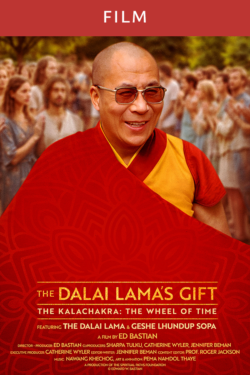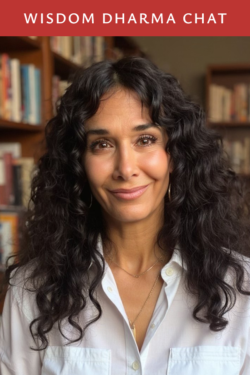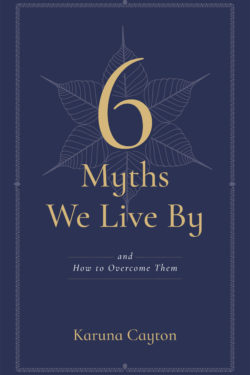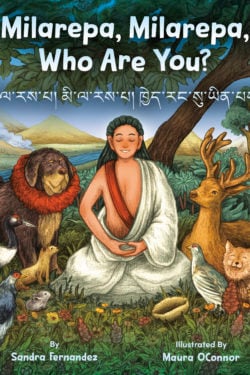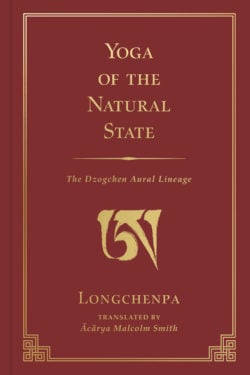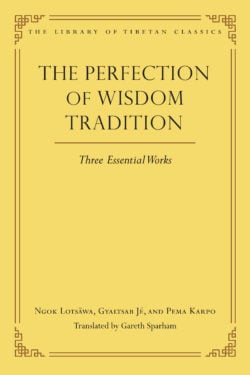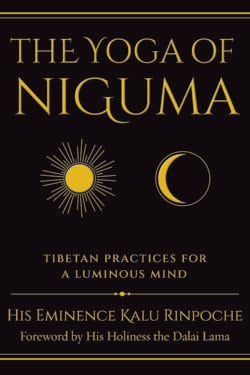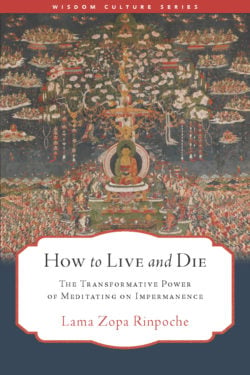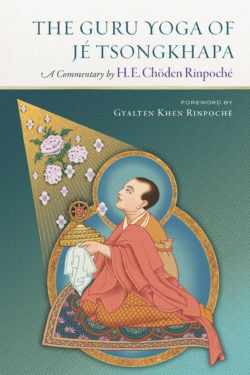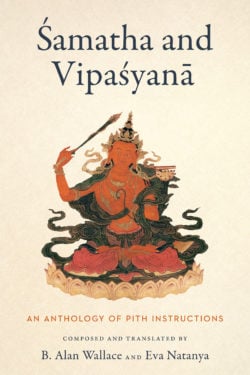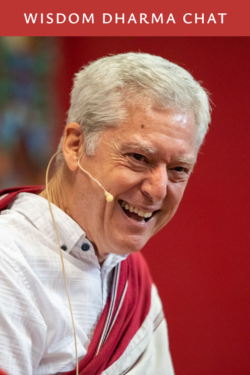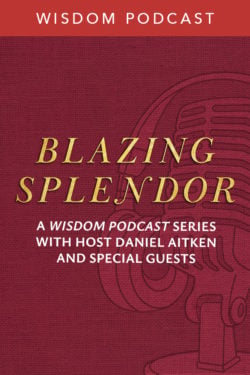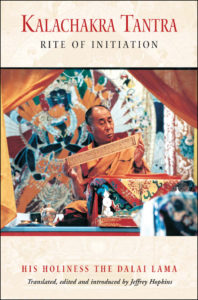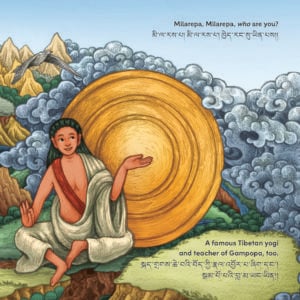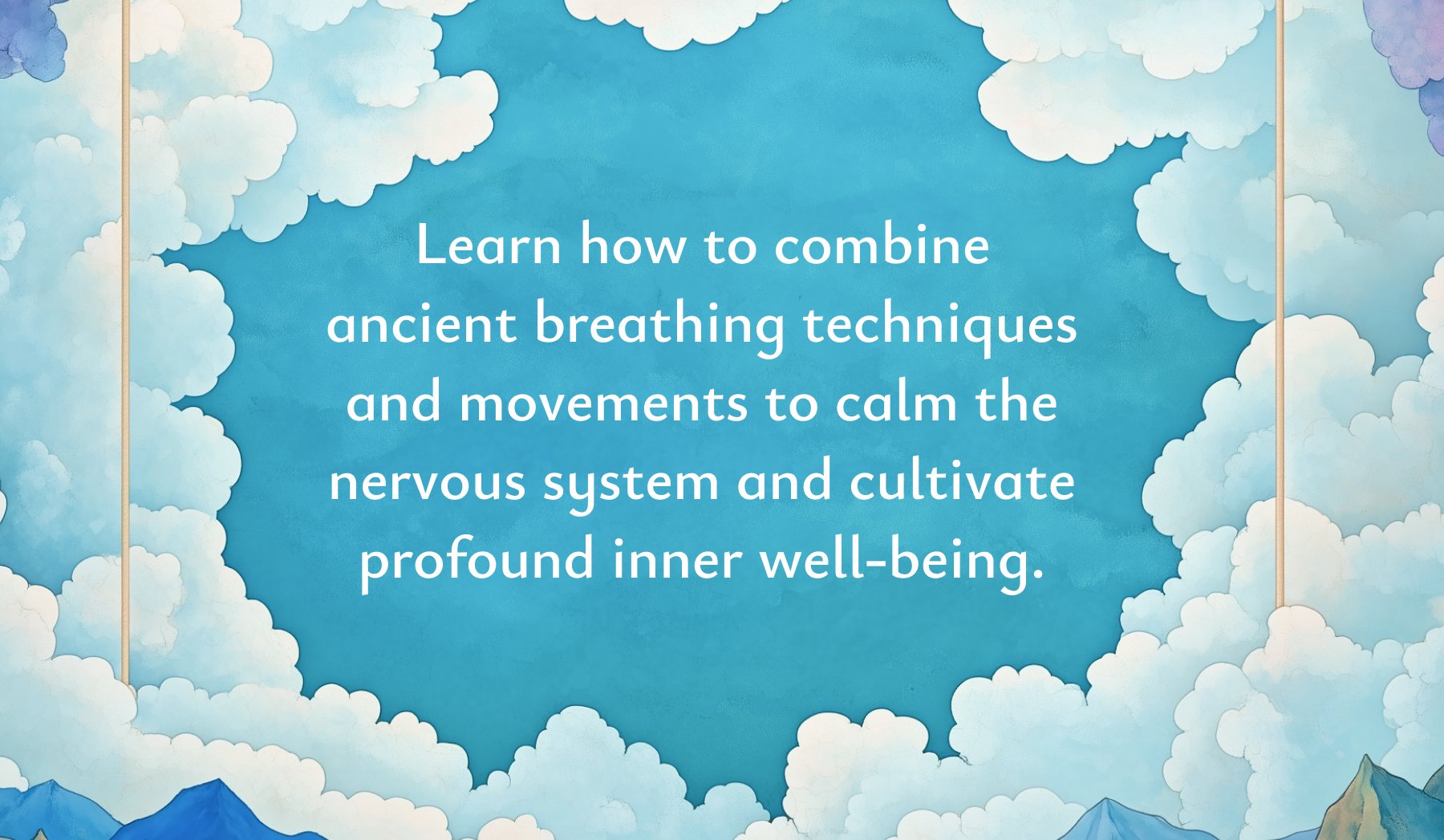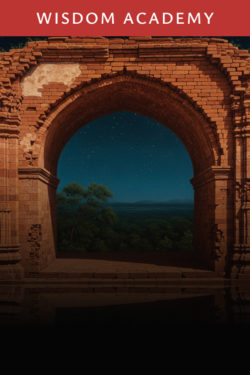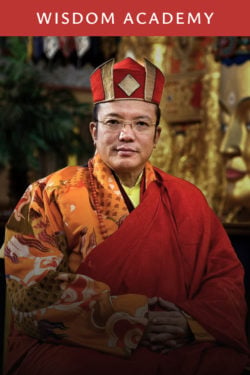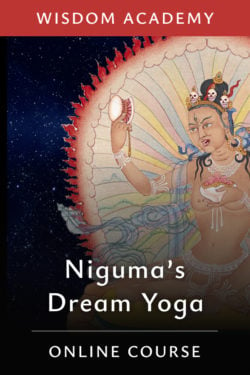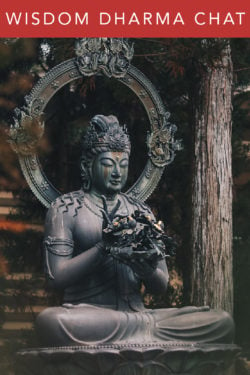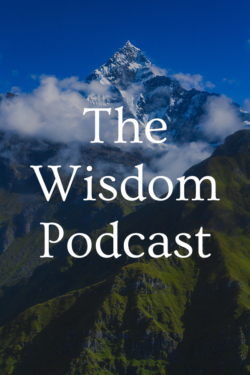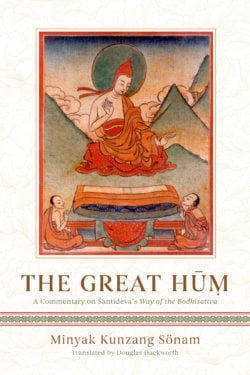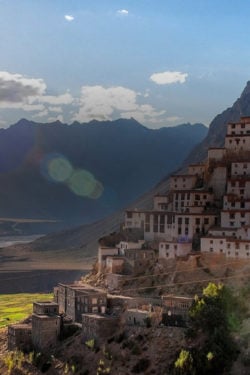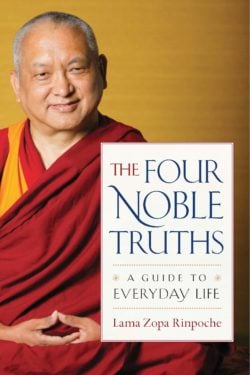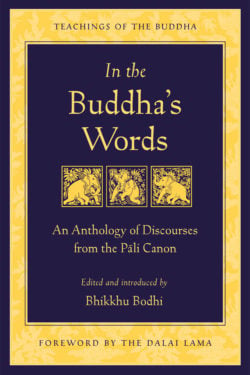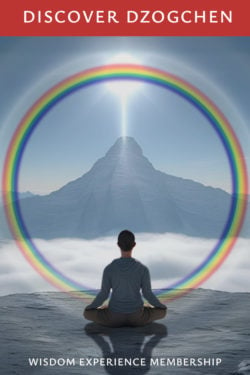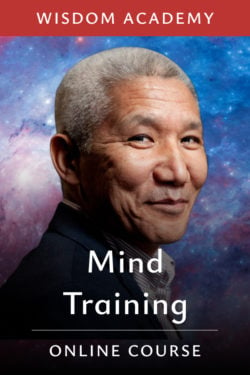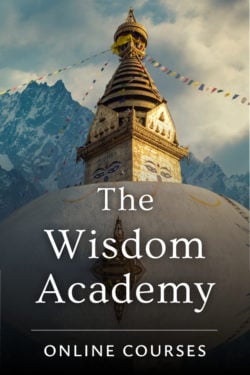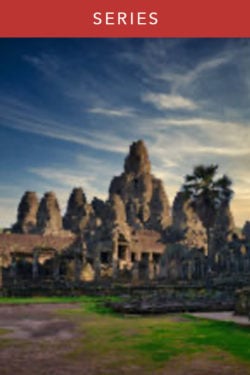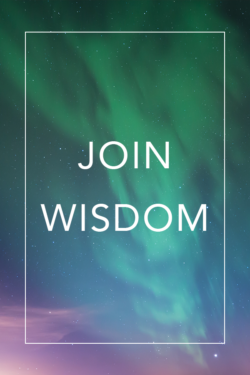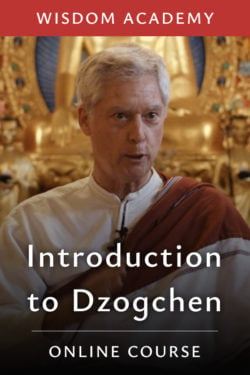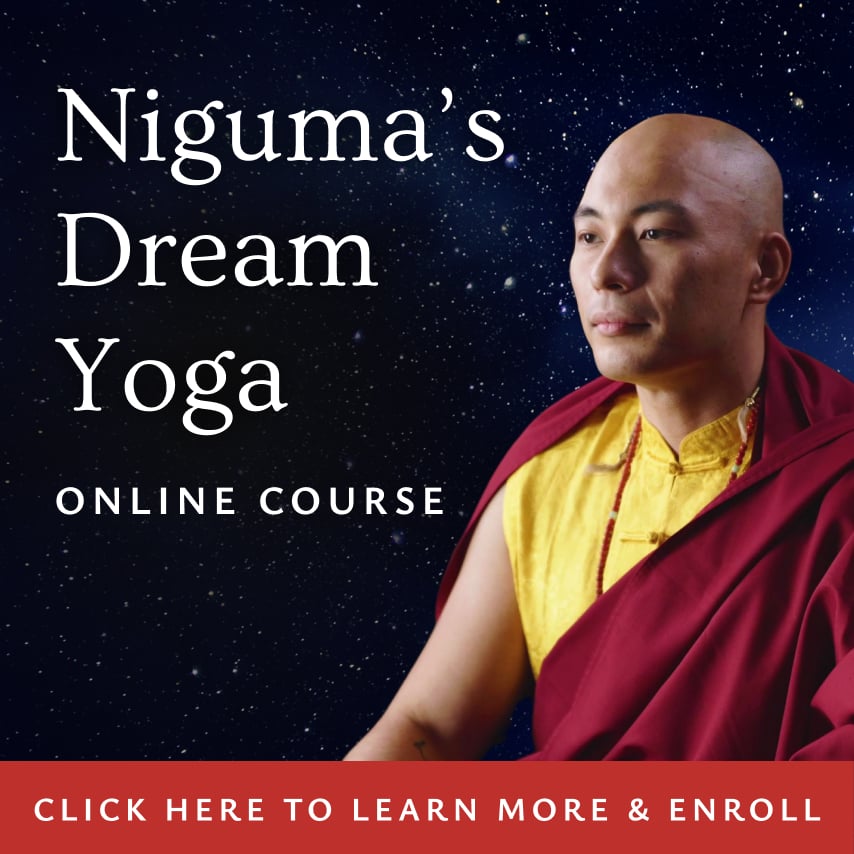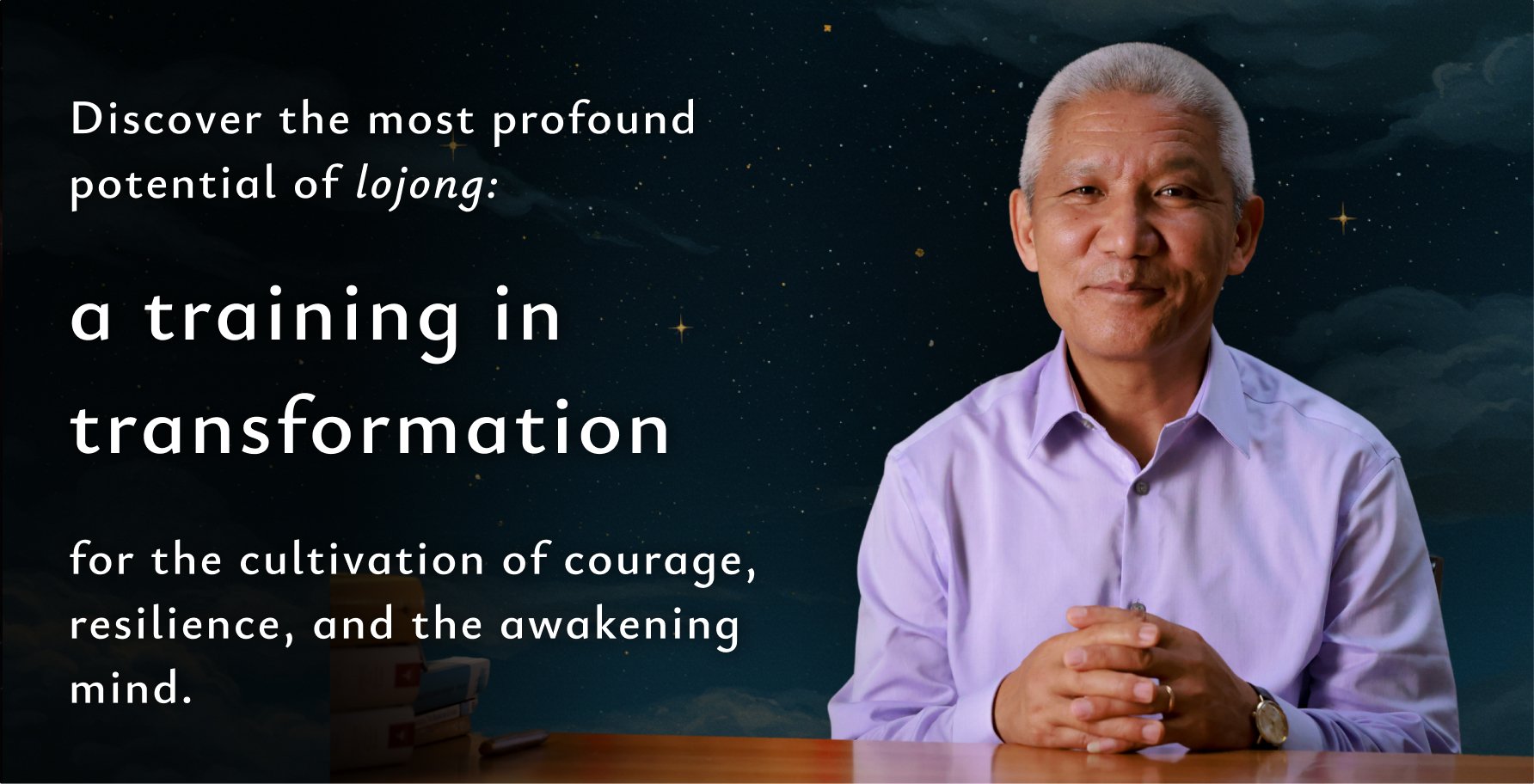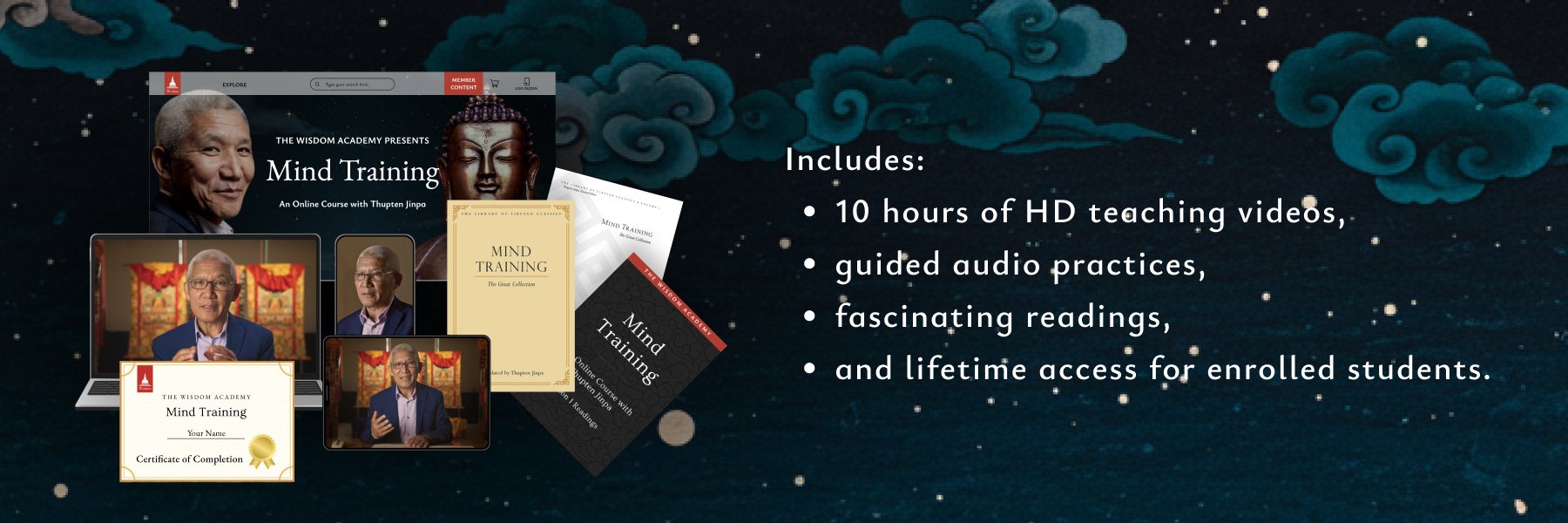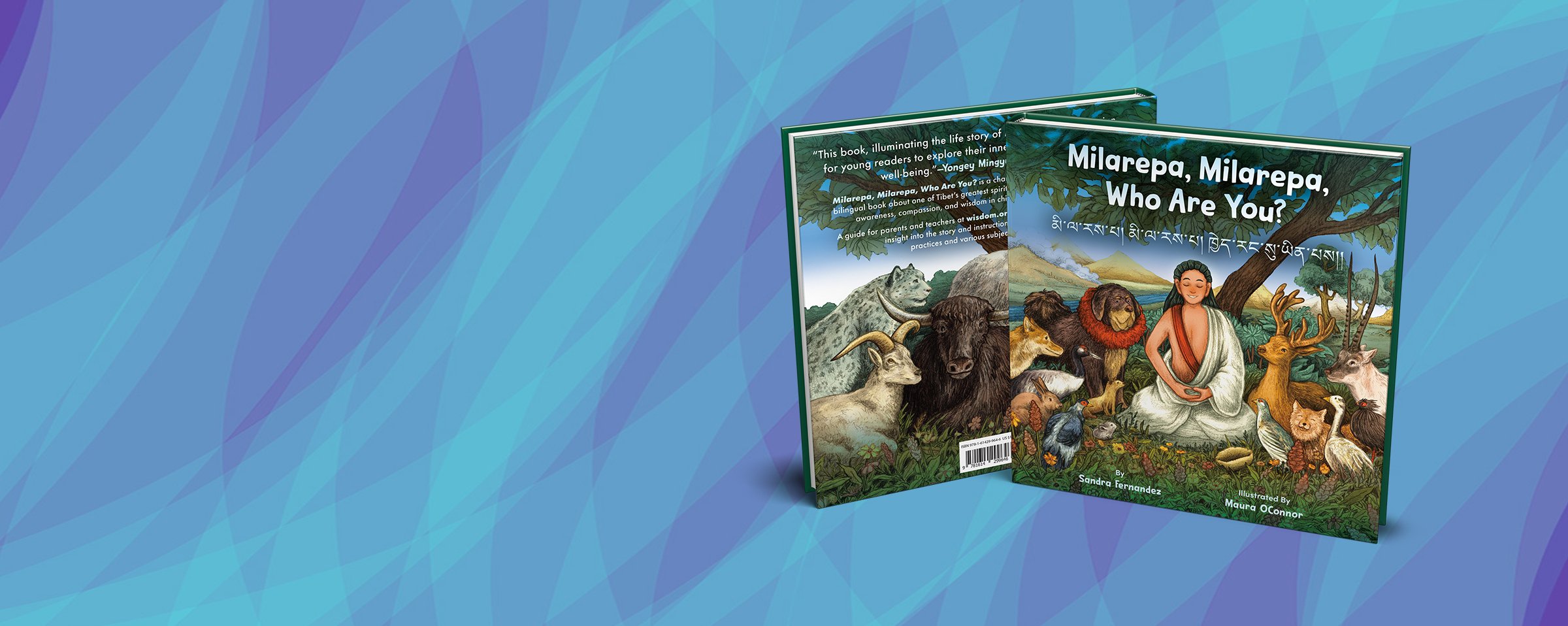New & Featured
The Dalai Lama’s Gift
The Kalachakra: The Wheel of Time
A hidden ritual. A sacred promise. A transformed cornfield.
In 1981, His Holiness the Fourteenth Dalai Lama accepted a heartfelt invitation from Geshe Lhundup Sopa, a revered Tibetan master, to perform the Kalachakra (Wheel of Time) initiation in the United States for the first time, marking a pivotal moment in the transmission of Tibetan Buddhism to the West. This powerful tantric ritual—never before held outside India or Tibet—was to take place in the heart of rural Wisconsin.
With only a few months to prepare, Geshe Sopa’s students, the monks of Namgyal Monastery, and volunteers built America’s first Kalachakra Temple from the ground up, transforming an open cornfield into a site of extraordinary spiritual awakening. That July, the temple hosted the historic ceremony that introduced thousands to one of the most profound and complex rituals in Tibetan Buddhism.
Working closely with coproducer Sharpa Tulku, Geshe Sopa, and the monks of Namgyal Monastery, filmmaker Dr. Ed Bastian and his team documented every stage of the ceremony—from preparations in India to the construction of the Kalachakra Temple and the initiation itself. Additionally, interviews with His Holiness the Dalai Lama, Geshe Sopa, and multiple initiates, many of whom would later emerge as influential Buddhist teachers, were filmed. These interviews include José I. Cabezón, Roger Jackson, Jan Willis, Vesna Wallace, and more. After the initiation, the original footage was entrusted to the Smithsonian Institution Film Archives for safekeeping.
Now, more than forty years later, that footage has been digitized and interwoven with contemporary interviews and the first-ever animation of the majestic three-dimensional mandala with the support of The Spiritual Paths Foundation. The resulting documentary revisits this landmark moment in time, inviting the viewer on a journey of devotion, resilience, and transformation, revealing a story of the power of one sacred encounter to ripple across generations.
While Ed and The Spiritual Paths Foundation have made The Dalai Lama’s Gift available free as an offering of peace and compassion, your generosity helps them to bring this film—and its message of awakening—to more people around the world. Please consider donating to the film’s foundation to help support this beautiful gift.

 .
. 








“The Dalai Lama’s Gift is a marvelous invocation of a historic event. It serves
as an excellent introduction to the Kalachakra initiation and Tibetan
Buddhist philosophy. Overall, this is an exceptional work!”
Gaetano Kazuo Maida
International Buddhist Film Festival
Founder/Executive Producer
Learn More
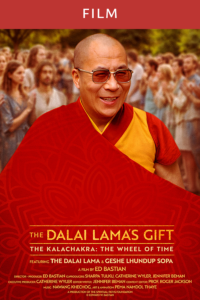 The Dalai Lama’s Gift
The Dalai Lama’s Gift
Visit the film’s website—dalailamagift.org—to learn more about the story and individuals behind the documentary. Read about director Ed Bastian’s approach to making the film, meet the production team, and discover its collaborators.
Additionally, please consider donating to the film’s foundation to help support this beautiful gift in the world. Your support allows the film team to reach a wider audience by scheduling more screenings, distributing it as an educational resource in libraries, universities, and Buddhist centers, and engaging in global outreach to share the film at festivals and cultural institutions to promote interfaith understanding and compassion.
Kalachakra Tantra
Rite of Initiation
By His Holiness the Dalai Lama,
translated, edited, and introduced by Jeffrey Hopkins
Associated with the promotion of world peace, the Kalachakra—or “Wheel of Time”—tantra is one of the most detailed and encompassing systems of theory and practice within Tibetan Buddhism. This book contains a complete translation of the Kalachakra initiation ritual as conferred by His Holiness the Dalai Lama, along with his commentary and a comprehensive introduction by Professor Jeffrey Hopkins that explores the Kalachakra’s rich symbolism, meaning, and history. The book also includes the Six-Session Yoga.
“Tantalizing glimpses into the philosophy and practice of Kalachakra.”—The Middle Way
The Kalachakra Mandala 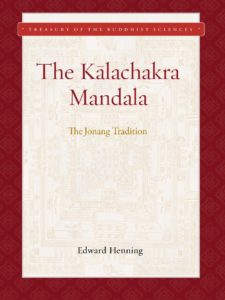
The Jonang Tradition
Translated by Edward Henning
A detailed, beautifully illustrated presentation of the construction and symbolism of the famed Kālachakra mandala, the crown jewel of the Indo-Tibetan tantric traditions.
“With great care, this book describes the symbolism, architectural design, and the multi-dimensional experience of the mandala. Such exquisite detail will be appreciated by scholars for its historical importance, artists for its representation of the mandala in both 2D drawings and 3D constructs, and perhaps most essentially, by Kālachakra practitioners for its instruction on how the vivid resplendence of the mandala is performatively visualized in their mind’s eye.”—Michael R. Sheehy, director of scholarship at the Contemplative Sciences Center, research assistant professor in Tibetan Buddhist studies in the Department of Religious Studies, and affiliated faculty at the Tibet Center at the University of Virginia
Like a Waking Dream
The Autobiography of Geshe Lhundub Sopa
Geshe Lhundub Sopa with Paul Donnelly
In Like a Waking Dream, Geshé Sopa frankly and observantly reflects on how his life in Tibet—a monastic life of yogic simplicity—shaped and prepared him for the unexpected. His is a tale of an exemplary life dedicated to learning, spiritual cultivation, and the service of others from one of the greatest living masters of Tibetan Buddhism.
“Geshe Sopa is one of the greatest living Buddhist masters of his generation. This marvelous lifestory, rich in detail and told in his own words, will captivate the hearts and minds of anyone who reads it.”—José Ignacio Cabezón, Dalai Lama Professor and Chair of the Religious Studies Department, UC Santa Barbara
Wisdom Dharma Chat | Dr. Joanne Cacciatore – Oct. 2025
October 29, 2025
In this episode of Wisdom Dharma Chats, Dr. Joanne Cacciatore, a bereaved mother, best-selling author, and founder of both the MISS Foundation and Selah Carefarm, joins host Daniel Aitken to discuss the upcoming documentary Selah, which raises awareness about grief and love. Directed by Jon Bregel, Selah is a powerful 30-minute documentary unlike any other. Filmed entirely on the grounds of Selah Carefarm, the world’s first for people living with traumatic grief, this intimate film opens a window into a place where sorrow and love live side by side. Through the stories of those who come seeking solace, connection, and the strength to keep going after devastating loss, this documentary reveals what it truly means to grieve—and to endure. At its heart, the film traces the vision of Dr. Joanne Cacciatore, whose own profound loss gave birth to Selah Carefarm. Woven into the narrative are raw and vulnerable moments from a four-day grief program, where participants allow their pain to be witnessed and their grief honored.
As Dr. Jo and Daniel delve into the documentary, how it came to be, and the process of creating it, their conversation explores the complexities of grief, especially in losing a child, and the emotional layers involved. It emphasizes the importance of self-care and support in navigating grief, including the unique challenges of grieving in a world that often doesn’t want to acknowledge it.
If you or someone you know is grieving, we invite you to learn more about Dr. Jo’s work through one of the resources below.
Learn more and help support the creation of Selah here.
Explore the work of the Selah Carefarm on their website, including how you can visit.
Continue to stay in touch with Dr. Jo through her website, The Center for Loss and Trauma
Explore The MISS Foundation here.
Learn more about Compassionate Bereavement Care Certification
Discover Dr. Jo’s work with Wisdom Publications here, including her books, online course, and more.
Meet Our Guest
 Dr. Joanne Cacciatore
Dr. Joanne Cacciatore
Dr. Joanne Cacciatore is a bereaved mother and the founder of the MISS Foundation, an international NGO that serves families whose children have died, and the Selah Carefarm, a sustainable restorative community that provides aid to anyone suffering traumatic grief. She is also a Professor and Senior Scholar in the Wrigley Institute of Sustainability at Arizona State University, spearheading the Graduate Certificate in Trauma and Bereavement. Her best selling book, Bearing the Unbearable: Love, Loss, and the Heartbreaking Path of Grief, is a national award-winning best seller that has helped revolutionize the way our culture thinks, and feels, about grief. She works with and counsels families from all around the world who have experienced catastrophic deaths. She served on Oprah and Prince Harry’s Mental Health Advisory Board for several years and was featured in their docuseries ‘The Me You Can’t See.” Dr. Jo, believing that current practices around food production are a social, ethical, and environmental justice issue, is a vegan and hasn’t eaten meat since 1972. She also teaches meditation, mindfulness, and compassion and ahimsa practices to students and clients from around the world. If you’re a provider seeking supervision or consultation, For more information on Dr. Jo visit her website.
6 Myths We Live By
Buddhist wisdom for everyday problems rooted in Buddhist psychology and meditation, 6 Myths We Live By shows us how to uncover our misperceptions and leads us on a path to self-development.
The truth is you probably believe all sorts of myths, but you don’t even know it. To escape any hardship, any suffering or discomfort, we all believe myths about how the world works and how we live in that world. In 6 Myths We Live By, therapist and long-time Buddhist practitioner Karuna Cayton guides us through six common myths that may give us comfort, but actually only perpetuate our problems:
the myth of reality,
the myth of identity,
the myth of permanence,
the myth of randomness,
the myth of happiness, and
the myth of only living once.
Cayton takes us through each of these myths using real-world examples and draws upon Buddhist principles, psychology, and meditation practices to show how we can wake up to reality. By planting a seed of doubt about the beliefs that we’ve always thought were true, we can open our eyes and deepen our relationship with the way we see our life, our potential, and the nature of our struggles and achievements.
Milarepa, Milarepa, Who Are You?
A charming, beautifully illustrated, bilingual book about one of Tibet’s greatest spiritual teachers—sure to inspire awareness, compassion, and wisdom in children and adults alike that includes an online guide for parents and teachers.
Milarepa is celebrated throughout the Himalayas as one of the most inspiring Buddhist figures from Tibetan history. This beautifully illustrated telling of his life and teachings, with Tibetan translation, lets children explore his extraordinary story. Milarepa went through an incredible transformation, overcoming suffering and his own misdeeds with the help of a wise teacher to become a great spiritual teacher in his own right.
Through the story and teachings of Milarepa, we can see that it is always possible to let our inner goodness shine, no matter what we’ve done in the past. Every moment creates a new opportunity to settle the mind and open the heart. Milarepa’s resilience, fearlessness, mental clarity, and compassion have been beacons of inspiration for a thousand years and resonate as deeply today as they have through the centuries.
To honor Milarepa’s spontaneous songs—classically known as dohas in Sanskrit, which communicated his experiences to others—this book is written in poetic form. It explores the wisdom of his teachings in the form of a rhythmic, call-and-response duet.
Click here to receive an online guide for parents and teachers that further expands on the themes of the book by providing lesson ideas, meditation activities, and guidance for learning about language, history, and art.
Yoga of the Natural State
Experience for the first time in English the aural lineage of the Great Perfection Dzogchen tradition, expertly brought to life by the practitioner and translator Ācārya Malcolm Smith.
Longchen Rabjam, or Longchenpa as he is popularly known, stands as one of the great Nyingma masters of Tibetan Buddhism, producing a wealth of texts in the Dzogchen, or Great Perfection, tradition. This volume presents eight texts found in two collections of Longchenpa’s writings—the Lama Yangtig and the Zabmo Yangtig. These texts record a special experiential tradition of Great Perfection teachings by Chetsun Sengé Wangchuk to a single student in the eleventh century, a tradition passed down mouth-to-ear, one student at a time, until it was set down in writing by Longchenpa in the mid-fourteenth century.
While Longchenpa’s writings on the Seventeen Tantras are widely known, his writings on the Dzogchen aural lineage have received little attention, even though Tibetan histories show that it is the aural lineage that ensured the survival of the Great Perfection lineage. With this book of translations, we now have for the first time in English these records of the most important aural lineage in the Great Perfection tradition.
Unlike the arcane and difficult textual tradition associated with the Seventeen Tantras, the aural lineage teachings are experiential, easy to understand and practice, straightforward, and written in relatively simple language rich with similes and metaphors. The texts included in Yoga of the Natural State concern all aspects of the Great Perfection teaching, ranging from how to practice the preliminary practices, how the Great Perfection is introduced to qualified students, the correct view, meditation, and conduct of the practitioner, how to attain the state of liberation in this life, and how to recognize and attain liberation in the bardos.
Yoga of the Natural State: The Dzogchen Aural Lineage is an invaluable addition to the library of anyone interested in Great Perfection theory and practice.
Sit
A popular Buddhist teacher guides you through strategies to build and maintain a rock-solid daily meditation practice—from setting reminders to dealing with setbacks to introducing the philosophical concepts underpinning Buddhist meditation—and everything in between.
It’s widely known that there are many benefits to meditation, particularly if undertaken regularly, but making it a daily habit can be a challenge for many people. Why? Because it takes more than willpower.
Here, longtime meditation teacher and Buddhist blogger Bodhipaksa presents a collection of strategies and tools to help build a rock-solid daily meditation practice into your life. The book is divided into twenty-eight chapters, one for each day.
Each chapter starts with a Practice Reminder, just a few words reminding readers of the importance of practicing meditation rather than merely reading about it. There’s also a link to a web page of guided meditations.
Following that is a Today section, a brief summary of the day’s reading.
Then there’s a Strategies section, which offers suggestions to help readers build the habit of meditating daily. Strategies can be as simple as setting reminders or using a meditation timer, or more involved tools such as changing any belief that you lack what it takes to meditate daily.
That’s followed by a Going Deeper section, with a deeper exploration of some of the Buddhist teachings underpinning our practice, often referring to the suttas, or scriptures, of early Buddhism.
Next is a Reflection section, which encourages readers to keep a journal to make the content of the Going Deeper section more experiential.
Each chapter ends with a Last Words section, quickly summarizing the Going Deeper section.
To help you get started, Bodhpaksa has recorded eighteen meditations for you to listen to and provided a 28-day calendar to help track your deepening meditation habit. Simply scan the QR code in the book for access.
The Perfection of Wisdom Tradition
The perfection of wisdom (prajñāpāramitā) is a key element of the path in Mahāyāna Buddhism. Wisdom here is the transcendent wisdom of a bodhisattva who has penetrated the nature of reality, the emptiness (śūnyatā) of all things. Sutras that take the Perfection of Wisdom as their name emerged in the centuries before and after the start of the Common Era and became foundational for the nascent Mahāyāna. These include the well-known Heart Sūtra and Diamond Cutter Sūtra as well as the Perfection of Wisdom sutras in eight thousand and a hundred thousand lines.
Study of the Perfection of Wisdom sutras in Tibet has historically been through commentaries on the Ornament for the Clear Realizations (Abhisamayālaṃkāra), a short verse distillation in eight chapters attributed to Maitreya that was expanded in India by such figures as Asaṅga, Haribhadra, and Ārya-Vimuktisena. The three works in the present volume reflect the diversity of the Tibetan commentarial tradition on these Indian works.
Ngok Loden Sherab’s (1057–1109) Topical Summary marks the beginning in Sangphu Monastery of the most influential Perfection of Wisdom commentarial tradition. Ngok’s short work leads the reader briskly through the Abhisamayālaṃkāra’s seventy topics, presenting what would become the standard framework for explaining the Perfection of Wisdom in Tibet. The entirety of Haribhadra’s Vivṛti commentary has been embedded in Ngok’s text.
Gyaltsab Darma Rinchen’s (1364–1432) Way to Practice the Sequence of Clear Realizations, structured as a defense of the meditation system set forth by his guru Tsongkhapa in the Great Treatise on the Stages of the Path to Enlightenment, links the stages of the path expanded into the seventy topics with the actual practices of an accomplished yogi. Working outward from the middle of the Abhisamayālaṃkāra’s fourth chapter, it explains how the Perfection of Wisdom is integrated into a total and complete meditational practice for the attainment of buddhahood.
The great Drukpa Kagyü scholar Kunkhyen Pema Karpo’s (1527–92) Sacred Words of Lord Maitreya is the most detailed and systematic of the three works, supplementing explanations of the Perfection of Wisdom based on the Abhisamayālaṃkāra with verses from the Mahāyānasūtrālaṃkāra (Ornament for the Mahāyāna Sūtras) and the Uttaratantra (Sublime Continuum). This work as presented here includes within it a complete translation of the Abhisamayālaṃkāra’s eight chapters.
Learn more about the Library of Tibetan Classics
Learn about becoming a benefactor of the Library of Tibetan Classics
The Yoga of Niguma
Immerse yourself in the extraordinarily transcendent practice of the yoga of Niguma.
The yoga of Niguma comes to us from a secret tradition passed down over hundreds of years by Buddhist yogis in Tibet. The practice originated with the eleventh-century female yogini Niguma, who mastered and transmitted a tradition of remarkable practices that culminate in physical, spiritual, and emotional wellness. In this book, His Eminence Kalu Rinpoche, a Tibetan master who holds this lineage for today’s generation, is now opening up the practice to make its extraordinary benefits accessible to the modern yogi.
The yoga of Niguma consists of twenty-five sets of yogic exercises. Some are physically challenging while others are quite subtle in nature; all are grounded in meditation on the breath. Kalu Rinpoche illuminates the practice by sharing his own personal journey with the yoga of Niguma and how the lineage came to be. He also teaches us how we can prepare the mind for this practice with meditation and how to balance our emotions. Then, Rinpoche takes us step-by-step through the twenty-five illustrated sequences of Niguma yoga. Coauthor Michele Loew, an international yoga teacher, shares supportive Hatha yoga techniques that will bolster your Niguma yoga practice.
The yoga of Niguma is a revered method that integrates body, mind, and breath. Dive in to discover for yourself a gradual, profound groundswell of subtle awakening.
Rinpoche and Michele have recorded two full-length videos that demonstrate Niguma yoga sequences and supportive hatha yoga postures and supplement the instructions in the book. To learn more and watch the videos simply purchase the book and scan the QR code on the Additional Resources page in your copy.
You may also be interested in Rinpoche’s courses from Wisdom, Niguma’s Dream Yoga and The Illusory Body and Mind.
Wisdom Dharma Chat | His Eminence Kalu Rinpoche and Michele Loew – Oct. 2025
October 19, 2025
In this episode of Wisdom Dharma Chats, His Eminence the Second Kalu Rinpoche and Michele Loew join host Daniel Aitken for a delightful conversation about their new book, The Yoga of Niguma. Rinpoche and Michele discuss their individual experiences with the yoga of Niguma and its transformative potential for practitioners today. Rinpoche shares personal stories about learning the practice and now teaching it, offering candid insights into the balance between tradition and modern life, while Michele explores how yoga and meditation can serve as complementary paths, helping students integrate body and mind through embodied awareness. Together with Daniel, they discuss how the yoga of Niguma supports healing, mindfulness, and compassion, encouraging practitioners not to be intimidated by the practice but to approach the teachings with sincerity and humility.
Show Notes:
- Learn more about Rinpoche and Michele’s new book, The Yoga of Niguma
- Learn more about Rinopche’s most recent online course, Niguma’s Dream Yoga
- Learn more about Rinpche’s first Wisdom Academy online course, The Illusory Body and Mind
- Learn more about Rinpoche and his work at https://shangpakagyu.org/
- Learn more about Michele Loew and her upcoming retreats at https://www.micheleloew.com/
Meet Our Guest
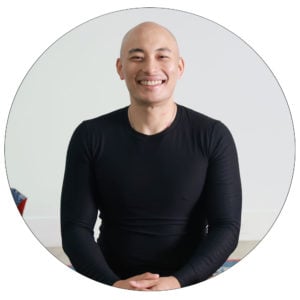 His Eminence the 2nd Kalu Rinpoche
His Eminence the 2nd Kalu Rinpoche
His Eminence the 2nd Kalu Rinpoche was born on September 17, 1990 in Darjeeling, India. His father, Lama Gyaltsen, was a nephew of the previous Kalu Rinpoche and had also been his secretary since his youth. The 2nd Kalu Rinpoche was recognized on March 25, 1992 by Tai Situ Rinpoche. His Holiness the Dalai Lama has officially confirmed the recognition.
On February 28, 1993, he was inducted into Samdrub Darjay Chöling (Sonada). His father passed away in 1999 and he asked to live in the monastery of Bokar Rinpoche in order to grow and study under his direction. In 2004, he began the traditional three-year retreat, which he completed in 2008. In 2009, he received from Tai Situ Rinpoche all the transmissions of the Shangpa Lineage. On this occasion, he undertook to confer 108 times the cycle of initiations of the lineage from which he is now the holder.
In 2010, Kalu Rinpoche traveled to the West and took charge of the meditation centers created by the first Kalu Rinpoche around the world. In 2014, he returned to Burgundy, in the center of meditation Palden Shangpa La Boulaye, to teach and to resume the tradition of Monlam Shangpa initiated by his predecessor. He has done the same in the United States in 2019.
Each year, Kalu Rinpoche gives initiations and teachings around the world.
Michele Loew
Michele Loew is an international yoga teacher and practitioner of Hatha and Tibetan yogas. She has taught, practiced, & studied avidly since 1998, and ran her longtime beloved yoga studio, The Yoga Space in Portland, Oregon, from 2006-2025. You can now practice with her online or at in-person retreats, yoga immersions, and teacher trainings.
She is known as a teacher’s teacher and is respected for her 200 & 300 hr Yoga Alliance Certification schools and her ability to integrate modern therapeutics and cutting-edge science with lineage-based traditional yoga practices.
She is the co-author of The Yoga of Niguma with H.E. Kalu Rinpoche and shares Niguma’s yoga practices and the dharma around the world.
Her love and commitment to the unexcelled yoga tantras of Varayana and the sister science of Hatha Yoga as paths we can take towards perfect enlightenment, seeing both as powerful interconnected traditions, infuses her work with great joy & commitment towards sharing yoga and spirituality to create a more compassionate and awakened world.
She honors the lineage of teachers she comes from and bows to her longtime Hatha & Classical Yoga teacher Richard Freeman for elucidating the middle path of love with the utmost clarity and compassion and His Holiness the Dalai Lama for sharing the “religion” of kindness. She is on the board of Tibet House US and is committed to supporting and preserving Tibetan Culture and their dharma practices for the benefit of all.
Her Clearlight Yoga school continues to educate teachers around the world on the enlightened sleep yoga practices such as Yoga Nidra and Dream Yoga and the 6 yogas of Niguma and Naropa.
How to Live and Die
What death is, how we die, what minds we need at death and what happens after death—only by knowing about death and rebirth can we actually fully understand what life is and so learn how to live fully.
—Lama Zopa Rinpoche
There is arguably no truth more foundational to Buddhism than this: everything is impermanent. We can see this in the world all around us; old systems break down, relationships change. Death comes for those we love and, inevitably, for us.
In this book, the late, beloved teacher Lama Zopa Rinpoche walks us through the traditional, revelatory practices of meditating on the fact of impermanence and even—especially—on death itself. Rather than shy away from this reality, we look straight at it, and thus we learn not only how to not fear death, but how to live.
The Guru Yoga of Jé Tsongkhapa
Explore the guru yoga practice of Jé Tsongkhapa with a legendary meditation master.
The Hundreds of Deities of Tuṣita is an inspiring and well-loved guru yoga practice that originated from Jé Tsongkhapa himself and was disseminated by the First Dalai Lama. In this book, Chöden Rinpoché—a celebrated scholar who was chosen as a debate partner for His Holiness the Dalai Lama, as well as an accomplished yogi who spent nineteen years in solitary retreat—offers two different commentaries to guide the reader’s understanding.
Rinpoché’s first commentary is based on the tantric oral tradition as presented by the great lama and scholar Pabongkha Dechen Nyingpo in his own inspired commentary on The Hundreds of Deities of Tuṣita, called A Treasury of Precious Jewels, which is presented here in full. Rinpoché adds clarifying instruction to Jé Pabongkha’s work, bringing out the deeper meaning of the text and revealing how ordinary practitioners may understand and apply Pabongkha’s instruction. The second commentary from Rinpoché is a condensed commentary based on the sūtra tradition. Thus, the reader is treated to two different perspectives of the guru yoga practice of Jé Tsongkhapa.
Previously published as Opening the Door of Blessings, this edition has been revised and updated, and is an essential edition to any practitioner’s library.
Samatha and Vipasyana
Invaluable instructions on core meditations designed to bring about irreversible spiritual transformation.
For those who aspire to the total enlightenment of a buddha, the contemplative practices of śamatha and vipaśyanā play a crucial role from the beginning of the path to its culmination. Designed to free one first from the five obscurations that hinder the natural clarity and balance of the mind—and eventually from the ignorance that is the root of suffering—these practices, when imbued with bodhicitta, enable one to reach a pivotal stage within the Mahāyāna path of accumulation. This is the stage at which one gains irreversible, gold-like bodhicitta, after which one is assured of being a bodhisattva in all one’s future lifetimes until enlightenment.
The instructions gathered here are like a string of pearls spanning from the eleventh century to the present day. They include teachings from great Indian masters as well as renowned lamas of the past and present from the four major orders of Tibetan Buddhism, and many of the texts translated here stem from visionary teachings revealed by Mañjuśrī, Vajrapāṇi, Avalokiteśvara, and Padmasambhava. Introductions rich in biographical detail accompany each group of translated entries, providing historical context and drawing connections between complementary lineages. The concluding pith instructions from Lama Alan Wallace bring the anthology directly into the domain of contemporary practice, and a collection of links to a rich array of recorded oral teachings by eminent lamas, including His Holiness the Dalai Lama’s first teachings in the West, make this volume a treasure trove for the practitioner and scholar alike.
Wisdom Dharma Chat | Lama Alan Wallace – Aug. 2025
August 13, 2025
In this episode of Wisdom Dharma Chats, host Daniel Aitken welcomes Lama Alan Wallace to discuss his new volume, Śamatha and Vipaśyanā, and to reflect on his formative years studying and practicing in India. Lama Alan shares stories from his rigorous training under eminent Tibetan masters, highlighting how these experiences shaped his understanding of the Mahāyāna path and the union of wisdom and skillful means. The conversation delves into the essential role of śamatha and vipaśyanā in overcoming the five obscurations, cultivating irreversible bodhicitta, and progressing toward full enlightenment. Lama Alan explains how these practices—rooted in centuries-old instructions—are equally relevant today, offering a powerful antidote to modern-day distractions and a path toward both spiritual awakening and psychological healing.
Daniel and Lama Alan also explore the intersection of contemplative traditions with science and mental healthcare, noting the limitations of modern education and research funding in addressing the mind’s deeper needs. They envision a renaissance in contemplative practice that integrates precise, empirical methods for investigating consciousness with the transformative compassion at the heart of the Dharma. Rich with insight, history, and practical guidance, this conversation invites practitioners to bring these timeless meditations fully into the context of contemporary life.
Meet Our Guest
 Lama Alan Wallace
Lama Alan Wallace
B. Alan Wallace is president of the Santa Barbara Institute for Consciousness Studies. He trained for many years as a monk in Buddhist monasteries in India and Switzerland. He has taught Buddhist theory and practice in Europe and America since 1976 and has served as interpreter for numerous Tibetan scholars and contemplatives, including H. H. the Dalai Lama. After graduating summa cum laude from Amherst College, where he studied physics and the philosophy of science, he earned his MA and PhD in religious studies at Stanford University. He has edited, translated, authored, and contributed to more than forty books on Tibetan Buddhism, medicine, language, and culture, and the interface between science and religion.
Alan is also the founder of the Center for Contemplative Research (CCR), which now has retreat center locations in Crestone, Colorado, and in Castellina Marittima, Italy. A new center is also being established in New Zealand. The CCR is dedicated to researching the role and methods of the ancient contemplative practices of Shamatha and Vipashyana, and their involvement in mental health and wellbeing, as well as their role in fathoming the nature and origins of human consciousness.
The CCR vision builds on the results of the Shamatha Project. It is guided by a Scientific Advisory Board that includes the Nobel Prize-winning physicist and biologist Steven Chu (Stanford University), neuroscientist and clinical psychologist David Presti (UC Berkeley), theoretical physicist Marcelo Gleiser (Director of the Institute for Cross-Disciplinary Engagement at Dartmouth College), and philosopher Michel Bitbol (Director of Research at the Centre National de la Recherche Scientifique). Cognitive scientists at the University of Pisa, the University of Trent, and the Scuola Superiore Sant’Anna in Pisa are committed to conducting research in collaboration with the CCR.
For an introduction, listen to The Nature of Reality: A Dialogue Between a Buddhist Scholar and a Theoretical Physicist. In this public dialogue, Alan Wallace and Sean Carroll, a world-renowned theoretical physicist and best-selling author, discussed the nature of reality from spiritual and scientific viewpoints.
Blazing Splendor: A Wisdom Podcast Series
During October of 2024, we released a Wisdom Podcast episode every Friday in celebration of the release of the collector’s edition of Blazing Splendor. These episodes featured special guests intimately connected to the volume and Tulku Urgyen Rinpoche. Read on to discover more about each episode and its guests before diving in and listening to each.
Blazing Splendor | A Wisdom Podcast Series #1
Marcia Binder Schmidt: Meeting Tulku Urgyen Rinpoche (#194)
Published October 4, 2024
 In the first episode of this celebratory series of episodes, Wisdom Podcast host Daniel Aitken is joined by Marcia Binder Schmidt, one of the editors of Blazing Splendor and a student of Tulku Urgyen Rinpoche. During this episode, she and Daniel discuss:
In the first episode of this celebratory series of episodes, Wisdom Podcast host Daniel Aitken is joined by Marcia Binder Schmidt, one of the editors of Blazing Splendor and a student of Tulku Urgyen Rinpoche. During this episode, she and Daniel discuss:
• how she began to practice Tibetan Buddhism;
• her impactful first meeting with Tulku Urgyen Rinpoche;
• how the book Blazing Splendor came to be;
• her involvement in preserving Rinpoche’s teachings through books; and
• so much more.
![]()
Blazing Splendor | A Wisdom Podcast Series #2
Erik Pema Kunsang: Timeless Teachings with Tulku Urgyen Rinpoche (#195)
Published October 11, 2024
 In this second episode of our celebratory Blazing Splendor Wisdom Podcast Series host Daniel Aitken is joined by Erik Pema Kunsang. Enjoy hearing Erik share profound experiences with Tulku Urgyen Rinpoche in “Timeless Teachings with Tulku Urgyen Rinpoche,” including a story he’s never shared before.
In this second episode of our celebratory Blazing Splendor Wisdom Podcast Series host Daniel Aitken is joined by Erik Pema Kunsang. Enjoy hearing Erik share profound experiences with Tulku Urgyen Rinpoche in “Timeless Teachings with Tulku Urgyen Rinpoche,” including a story he’s never shared before.
During this episode, Daniel and Erik discuss:
• how Rinpoche led him to the realization of the mind’s true nature;
• Rinpoche’s unique teaching methods;
• his diverse skills and humility;
• the enduring influence Rinpoche has had on Erik and countless others; and
• so much more.
![]()
Blazing Splendor | A Wisdom Podcast Series #3
Tsoknyi Rinpoche: Insights from My Father and Teacher, Tulku Urgyen Rinpoche (#196)
Published October 18, 2024
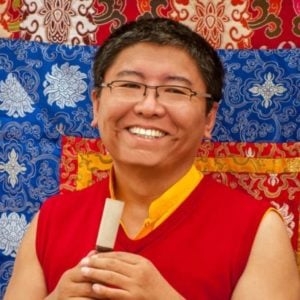 Welcome to the third episode of our celebratory Blazing Splendor Wisdom Podcast series! This episode was recorded earlier this year as a live Wisdom Dharma Chat where host Daniel Aitken was joined by special guest, Tsoknyi Rinpoche. During this episode, Rinpoche shares deep insights from his father, Tulku Urgyen Rinpoche’s teachings, along with personal anecdotes in celebration of the release of the collector’s edition of Blazing Splendor.
Welcome to the third episode of our celebratory Blazing Splendor Wisdom Podcast series! This episode was recorded earlier this year as a live Wisdom Dharma Chat where host Daniel Aitken was joined by special guest, Tsoknyi Rinpoche. During this episode, Rinpoche shares deep insights from his father, Tulku Urgyen Rinpoche’s teachings, along with personal anecdotes in celebration of the release of the collector’s edition of Blazing Splendor.
You’ll hear Daniel and Rinpoche discuss:
• Tulku Urgyen Rinpoche’s dual role in Rinpoche’s life as parent and teacher;
• Rinpoche’s handshake method, and his unique style of teaching;
• the most valuable teaching and advice that Tulku Urgyen Rinpoche gave to Rinpoche; and
• much more!
![]()
Blazing Splendor | A Wisdom Podcast Series #4
Yongey Mingyur Rinpoche: Tulku Urgyen Rinpoche’s Legacy (#197)
Published October 25, 2024
 In this, the fourth and final episode of our celebratory series, Wisdom Podcast host Daniel Aitken is joined by special guest Yongey Mingyur Rinpoche! Listen as Rinpoche guides you on a journey throughout his life, beginning with his early memories of his father, Tulku Urgyen Rinpoche, the impact his father had on him and his own teaching, all the way to his father’s passing. This episode is also available as a special video podcast. You’ll hear Rinpoche:
In this, the fourth and final episode of our celebratory series, Wisdom Podcast host Daniel Aitken is joined by special guest Yongey Mingyur Rinpoche! Listen as Rinpoche guides you on a journey throughout his life, beginning with his early memories of his father, Tulku Urgyen Rinpoche, the impact his father had on him and his own teaching, all the way to his father’s passing. This episode is also available as a special video podcast. You’ll hear Rinpoche:
• share memories from his childhood in Kathmandu and the Himalayas;
• discuss his initiation into meditation by his father to help manage his panic attacks;
• his father’s teaching style and how it changed as he got older;
• Tulku Urgyen Rinpoche’s tukdam;
• the influence that his father had on him, his own practice, and teachings; and;
• so much more.
![]()
Blazing Splendor | A Wisdom Podcast Series #5 – Bonus Episode
Chökyi Nyima Rinpoche: The Legacy of Tulku Urgyen and the Path to Kindfulness (#207)
Published May 17, 2025
 Join Chökyi Nyima Rinpoche and Daniel Aitken in this special bonus episode of our celebratory Blazing Splendor Wisdom Podcast series as they discuss The Legacy of Tulku Urgyen and the Path to Kindfulness. During this episode, Daniel and Rinpoche celebrate the rerelease of Blazing Splendor, and Rinpoche shares his memories and insights he gained from the teachings of his father, Tulku Urgyen Rinpoche. You’ll also hear Rinpoche and Daniel discuss:
Join Chökyi Nyima Rinpoche and Daniel Aitken in this special bonus episode of our celebratory Blazing Splendor Wisdom Podcast series as they discuss The Legacy of Tulku Urgyen and the Path to Kindfulness. During this episode, Daniel and Rinpoche celebrate the rerelease of Blazing Splendor, and Rinpoche shares his memories and insights he gained from the teachings of his father, Tulku Urgyen Rinpoche. You’ll also hear Rinpoche and Daniel discuss:
• Rinpoche’s impactful relationships with other high lamas and spiritual practitioners;
• the importance of practicing the foundational teachings of mindfulness, compassion, and ethical conduct;
• the essential role of mindfulness and kindfulness; and
• so much more.
![]()
About Tulku Urgyen Rinpoche & Blazing Splendor
Tulku Urgyen Rinpoche (1920–1996) is recognized as one of the greatest twentieth-century masters of Tibetan Buddhism and one of the first to bring the essential teachings of Buddhism beyond Tibet. Born into an illustrious family, he took as the core of his own practice the indivisibility of the three great traditions: the Dzogchen view of primordial purity and perfection, the Mahamudra view of mental nondoing, and the Middle Way view of holding no mental constructs. After fleeing Tibet shortly before the Dalai Lama, Tulku Urgyen Rinpoche devoted the rest of his life to trying to keep the spirit of the classical Tibetan spiritual system alive. Blazing Splendor is a translation of the name he was given by the head of the Kagyu order of Tibetan Buddhism, the name referring to the qualities of a realized master. He was a teacher without peer, who transformed the lives of those who came to him from the world over, among them Joseph Goldstein, Sharon Salzberg, Tara Bennett-Goleman, and Lama Surya Das.
“Tulku Urgyen Rinpoche was among Tibetan Buddhism’s greatest teachers of the twentieth century. His memoir, Blazing Splendor, invites us to join him as he looks back over a life that put him at the center of an unparalleled spiritual abundance. Through his unblinking eyes we meet remarkable contemplative adepts. And through the lens of his awakened awareness, we see the world from a fresh, eye-opening perspective. It is a sweeping account that shares with readers a world where miracles, mystery, and deep insight are the order of the day—a world as reflected through the open, lucid quality of Tulku Urgyen’s mind.”—from the foreword by Daniel Goleman, author of Emotional Intelligence
An insightful memoir illuminating the profound experiences and magical world of a Tibetan Buddhist master.
Blazing Splendor is a rare and profound gift: an intimate view into the world of one of the most celebrated and influential meditation masters of the last century. In these memoirs, Tulku Urgyen Rinpoche (1920–1996) recounts with incredible lucidity and humility his unique spiritual and familial heritage, his training in Tibetan Buddhism, and remarkable encounters with some of the most renowned masters of Tibet. This wide-reaching narrative stretches across generations to provide insight into the lived experience of contemplative adepts and into life before and after the Cultural Revolution, which left Tibet changed forever.
Born the great-grandson of the seminal terma-revealer Chokgyur Lingpa and a holder of both Nyingma and Kagyu lineages, Tulku Urgyen Rinpoche tells us of his unique family legacy, in which each generation has been saturated with spiritual accomplishments. He tells of how he, in time, became responsible for learning and then transmitting this lineage of Buddhist teachings, which continues today in the flourishing activities of his surviving sons Chokyi Nyima Rinpoche, Yongey Mingyur Rinpoche, and Tsoknyi Rinpoche. Blazing Splendor is a window into the life of a Mahamudra and Dzogchen master that illuminates the transmission of sacred teachings in a modern world—a world we inhabit too, where the miraculous and the mundane exist side by side.
This special, revised edition of the modern classic includes a handsome slipcase and features new images and color illustrations.
“Reading Blazing Splendor, I am transported back to my childhood at Nagi Gompa, where my father, Tulku Urgyen Rinpoche, shared these captivating stories of our family lineage and the remarkable beings that traversed his extraordinary life. The way these stories emanated from him speaks to the very essence of Dzogchen—heart wide open, ordinary and natural with a clarity unobstructed by details of place and time. As a child, I had no idea of the incredible impact and inspiration these living stories would have on my own life and the potential they could set alight in others. These profound teachings, hidden in plain sight, and offered with such warm-hearted generosity, make clear his unceasing devotion to his own teachers, and radiate the wisdom of the nine yanas.”—Yongey Mingyur Rinpoche
“Devotion is the core and essence of the precious Vajrayana path. If you want to hear and feel that devotion expressed in the clearest, most inspiring, and most eloquent possible way, you can’t do better than read these wonderful memoirs of the great Tulku Urgyen Rinpoche. Not only did he himself embody that devotion, but his personal stories introduce us intimately to some of the past century’s greatest living masters. This is truly a must-read for Vajrayana practitioners.”—Dzongsar Jamyang Khyentse Rinpoche
“In Blazing Splendor, Tulku Urgyen Rinpoche, one of Tibetan Buddhism’s most recent great masters, offers an intimate and in-depth history of Tibetan Buddhism through his own eyes. His firsthand accounts create a compelling narrative, spanning from the arrival of Buddhism in Tibet to the Cultural Revolution and beyond, providing rare insight into the personalities and stories of the lineage holders preceding him. This new edition also includes beautiful photos and imagery to further illustrate his story.”—Sharon Salzberg, author of Lovingkindness and Real Life
Yoga for Meditators
Going deeper in our practice isn’t always about spending more time on the cushion. For centuries, the great practitioners and masters have known that there are specific ways of working with body and breath which are essential to profound practice.
Through movement and breath practices drawn from these traditions, this new online course reveals the physical keys to deeper meditation.
Learn from three teachers who’ve spent decades bridging these ancient wisdom streams—discovering not just how to sit longer, but how to access the profound stillness that is the ground of awakening.
Save your seat now and experience how these practices can take your meditation practice to profound new depths.
This course is in self-study mode, so you can take it at your own pace. Enrolled students have lifetime access.
Tuition: $297
Includes lifetime access for enrolled students!
After enrolling, check your email for a welcome email with instructions on how to take the course. When you enroll in any Wisdom Academy course, you agree to our terms of use. Enrolled students have lifetime access to course materials. Wisdom is a 501(c)(3) nonprofit. Your tuition supports the creation of more courses like this one. Thank you! For more about our terms, please see the Wisdom Academy FAQ.
Calm Breath, Calm Mind
In this new online course from beloved Bön teacher Geshe YongDong Losar, find out how your breath can be a guide on your journey from suffering to profound well-being.
In the course, Geshe-la guides you through a deep exploration of the breath. Rooted in the Tibetan Bön tradition, the breath and movement practices you’ll learn will help you rediscover your breath as a calming and liberating vehicle for your journey from suffering and stress to freedom and ease.
Tuition: $297
Includes lifetime access for enrolled students!
After enrolling, check your email for a welcome email with instructions on how to take the course. When you enroll in any Wisdom Academy course, you agree to our terms of use. Enrolled students have lifetime access to course materials. Wisdom is a 501(c)(3) nonprofit. Your tuition supports the creation of more courses like this one. Thank you! For more about our terms, please see the Wisdom Academy FAQ.
The Wisdom Holiday Gift Guide
Embark on a journey of thoughtful giving this season with Wisdom’s curated selection of offerings. Our gift guide is designed to inspire the mind and nurture the heart, offering truly meaningful presents for your loved ones. Plus, by choosing Wisdom, you not only give a unique gift to your loved one, but also support our nonprofit mission and the dedicated authors and teachers who enrich our community. Explore a section of the gift guide by using the buttons above.
✨ Indicates a staff pick.
The Wisdom of the Nalanda Tradition
Important: After you enter your donation amount and click enroll, the course will be added to your cart. You can then click your cart icon at the top of the page and proceed to checkout. Please let us know if we can help with anything else.
Wisdom is delighted to offer this course on a donation basis, honoring the tradition of dāna — generosity that sustains the teachings for all.
As a nonprofit organization, Wisdom’s mission is to make authentic Buddhist teachings accessible to anyone who seeks them. We don’t have a set price—instead, we invite you to contribute what feels right for you. Your offering directly supports Wisdom’s ongoing work of producing and sharing these precious teachings with students around the world.
Please choose an offering level that feels right for your circumstances:
- Pay What You Can — any amount you’re comfortable giving; all are welcome to join.
- $75 — Open Offering: for those needing reduced tuition to participate.
- $177 — Sustaining Offering: helps cover course development and platform costs.
- $357 — Patron Offering: supports your participation and helps another student join.
Every donation, no matter the size, is deeply appreciated. Your generosity makes it possible for Wisdom to continue offering authentic Buddhist teachings worldwide and helps keep the Dharma flourishing for all.
The Dalai Lama’s Gift
The Kalachakra: The Wheel of Time
A hidden ritual. A sacred promise. A transformed cornfield.
In 1981, His Holiness the Fourteenth Dalai Lama accepted a heartfelt invitation from Geshe Lhundup Sopa, a revered Tibetan master, to perform the Kalachakra (Wheel of Time) initiation in the United States for the first time, marking a pivotal moment in the transmission of Tibetan Buddhism to the West. This powerful tantric ritual—never before held outside India or Tibet—was to take place in the heart of rural Wisconsin.
With only a few months to prepare, Geshe Sopa’s students, the monks of Namgyal Monastery, and volunteers built America’s first Kalachakra Temple from the ground up, transforming an open cornfield into a site of extraordinary spiritual awakening. That July, the temple hosted the historic ceremony that introduced thousands to one of the most profound and complex rituals in Tibetan Buddhism.
Working closely with coproducer Sharpa Tulku, Geshe Sopa, and the monks of Namgyal Monastery, filmmaker Dr. Ed Bastian and his team documented every stage of the ceremony—from preparations in India to the construction of the Kalachakra Temple and the initiation itself. Additionally, interviews with His Holiness the Dalai Lama, Geshe Sopa, and multiple initiates, many of whom would later emerge as influential Buddhist teachers, were filmed. These interviews include José I. Cabezón, Roger Jackson, Jan Willis, Vesna Wallace, and more. After the initiation, the original footage was entrusted to the Smithsonian Institution Film Archives for safekeeping.
Now, more than forty years later, that footage has been digitized and interwoven with contemporary interviews and the first-ever animation of the majestic three-dimensional mandala with the support of The Spiritual Paths Foundation. The resulting documentary revisits this landmark moment in time, inviting the viewer on a journey of devotion, resilience, and transformation, revealing a story of the power of one sacred encounter to ripple across generations.
While Ed and The Spiritual Paths Foundation have made The Dalai Lama’s Gift available free as an offering of peace and compassion, your generosity helps them to bring this film—and its message of awakening—to more people around the world. Please consider donating to the film’s foundation to help support this beautiful gift.

 .
. 








“The Dalai Lama’s Gift is a marvelous invocation of a historic event. It serves
as an excellent introduction to the Kalachakra initiation and Tibetan
Buddhist philosophy. Overall, this is an exceptional work!”
Gaetano Kazuo Maida
International Buddhist Film Festival
Founder/Executive Producer
Learn More
 The Dalai Lama’s Gift
The Dalai Lama’s Gift
Visit the film’s website—dalailamagift.org—to learn more about the story and individuals behind the documentary. Read about director Ed Bastian’s approach to making the film, meet the production team, and discover its collaborators.
Additionally, please consider donating to the film’s foundation to help support this beautiful gift in the world. Your support allows the film team to reach a wider audience by scheduling more screenings, distributing it as an educational resource in libraries, universities, and Buddhist centers, and engaging in global outreach to share the film at festivals and cultural institutions to promote interfaith understanding and compassion.
Kalachakra Tantra
Rite of Initiation
By His Holiness the Dalai Lama,
translated, edited, and introduced by Jeffrey Hopkins
Associated with the promotion of world peace, the Kalachakra—or “Wheel of Time”—tantra is one of the most detailed and encompassing systems of theory and practice within Tibetan Buddhism. This book contains a complete translation of the Kalachakra initiation ritual as conferred by His Holiness the Dalai Lama, along with his commentary and a comprehensive introduction by Professor Jeffrey Hopkins that explores the Kalachakra’s rich symbolism, meaning, and history. The book also includes the Six-Session Yoga.
“Tantalizing glimpses into the philosophy and practice of Kalachakra.”—The Middle Way
The Kalachakra Mandala 
The Jonang Tradition
Translated by Edward Henning
A detailed, beautifully illustrated presentation of the construction and symbolism of the famed Kālachakra mandala, the crown jewel of the Indo-Tibetan tantric traditions.
“With great care, this book describes the symbolism, architectural design, and the multi-dimensional experience of the mandala. Such exquisite detail will be appreciated by scholars for its historical importance, artists for its representation of the mandala in both 2D drawings and 3D constructs, and perhaps most essentially, by Kālachakra practitioners for its instruction on how the vivid resplendence of the mandala is performatively visualized in their mind’s eye.”—Michael R. Sheehy, director of scholarship at the Contemplative Sciences Center, research assistant professor in Tibetan Buddhist studies in the Department of Religious Studies, and affiliated faculty at the Tibet Center at the University of Virginia
Like a Waking Dream
The Autobiography of Geshe Lhundub Sopa
Geshe Lhundub Sopa with Paul Donnelly
In Like a Waking Dream, Geshé Sopa frankly and observantly reflects on how his life in Tibet—a monastic life of yogic simplicity—shaped and prepared him for the unexpected. His is a tale of an exemplary life dedicated to learning, spiritual cultivation, and the service of others from one of the greatest living masters of Tibetan Buddhism.
“Geshe Sopa is one of the greatest living Buddhist masters of his generation. This marvelous lifestory, rich in detail and told in his own words, will captivate the hearts and minds of anyone who reads it.”—José Ignacio Cabezón, Dalai Lama Professor and Chair of the Religious Studies Department, UC Santa Barbara
The Great Hūṃ
Śāntideva’s Way of the Bodhisattva (Bodhicaryāvatāra) is without a doubt one of the greatest masterpieces of Indian Buddhism and the single most influential text on Mahāyāna ethical theory. Since it was composed in around the eighth century, it has continuously animated the living tradition, especially in Tibet but now in the West as well, as more translations have become available. Its poetic evocations of the spirit of awakening allow readers to enter the mind of the bodhisattva.
Its longest commentary in any language is the one translated here, by the nineteenth-century master Minyak Kunzang Sönam. It came to be known as the Great Hūṃ because it fills the entirety of the third or hūṃ volume of the author’s collected works. Citing hundreds of sūtras, he shows how Śāntideva’s verses are beautifully integrated within, and express, the Buddhist textual universe. In particular, he ties Śāntideva’s verses with the Anthology of Training, the thematic collection of scriptural citations also compiled by Śāntideva, creating a detailed tapestry of Mahāyāna thought and practice. This volume presents Kunzang Sönam’s commentary on the first eight chapters, detailing the generation of the spirit of awakening, the cultivation of positive qualities, and the practice of meditation. Embedded in the commentary is a fresh translation of Śāntideva’s verses, making this an unparalleled guide to appreciating their layers of meaning and applying them in one’s practice and life.
You can access the translation of Śāntideva’s verses here.
You can access the complete native outline (sa bcad) here.
In-Depth Member Content
LATEST | POPULAR | COURSES | BOOKS | OTHER
LATEST & UPCOMING CONTENT
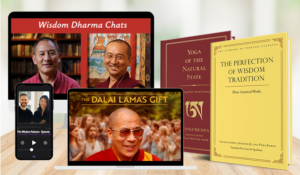 Read The Perfection of the Wisdom Tradition by Ngok Loden Sherab, Gyaltsab Darma Rinchen, and Kunkhyen Pema Karpo, translated by Gareth Sparham• Listen to Brendan Barca and Pema Sherpa in their Wisdom Podcast episode “The Daily Buddhist”
Read The Perfection of the Wisdom Tradition by Ngok Loden Sherab, Gyaltsab Darma Rinchen, and Kunkhyen Pema Karpo, translated by Gareth Sparham• Listen to Brendan Barca and Pema Sherpa in their Wisdom Podcast episode “The Daily Buddhist”
• Learn lojong, a powerful practice of transformation, strength, and resilience with Thupten Jinpa in Mind Training, the newest online course added to the Wisdom Experience Course Catalog for In-Depth members (General cost: $397, available for free to In-Depth members)
MOST POPULAR
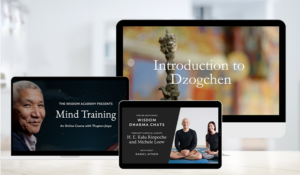 • Explore Dzogchen with Lama Alan in his online course, Introduction to Dzogchen (General cost: $247, available for free In-Depth members)
• Explore Dzogchen with Lama Alan in his online course, Introduction to Dzogchen (General cost: $247, available for free In-Depth members)
• Learn lojong, a powerful practice of transformation, strength, and resiliencewith Thupten Jinpa in Mind Training (General cost: $397, available for free to In-Depth members)
• Discover The Foundations of Mindfulness with Bhikkhu Anālayo (General cost: $397, available for free to In-Depth members)
• Watch His Eminence Kalu Rinpoche and Michele Loew in their Wisdom Dharma Chat on The Yoga of Niguma with host Daniel Aitken
SELECTED COURSES

To see the full Wisdom Experience Course Catalog, click here.
• Dive into one of the five classic Dzogchen treatises by Düdjom Lingpa, The Foolish Dharma of an Idiot Clothed in Mud and Feathers, with Lama Alan Wallace. (General cost: $547, available for free In-Depth members)
• Receive detailed oral commentaries from renowned Tibetan Buddhist teacher Lama Alan Wallace on one of the five classic Dzogchen treatises by Düdjom Lingpa, Buddhahood Without Meditation (General cost: $547, available for free In-Depth members)
• Explore Shamatha: Meditation for Balanced Living with Lama Alan Wallace (General cost: $247, available for free In-Depth members)
• Learn How The Mind Works with Thupten Jinpa (General cost: $397, available for free In-Depth members)
SELECTED BOOKS
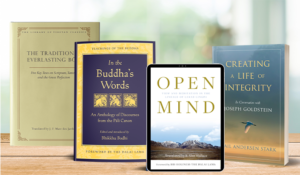 To see all the books available in the Reading Room, click here, and don’t forget that as an In-Depth member, you get 20% off all book purchases through our website.
To see all the books available in the Reading Room, click here, and don’t forget that as an In-Depth member, you get 20% off all book purchases through our website.
• Read The Tradition of Everlasting Bön translated by J. F. Marc des Jardins
• Read In the Buddha’s Words, introduced and translated by Bhikkhu Bodhi
• Read Creating a Life of Integrity by Gail Andersen Stark
• Read Open Mind translated by B. Alan Wallace
SELECTED OTHER CONTENT
To see other video content available, click here.
• Read Essential Mind Training translated by Thupten Jinpa
• Build a comprehensive foundation in Buddhist philosophy with Jay Garfiend in Buddhist Philosophy in Depth, Part 1 by exploring its core teachings, major thinkers, and evolving approaches to ethics, metaphysics, and practice (General cost: $247, available for free In-Depth members)
• Read The Truth of Suffering, an excerpt from 6 Myths We Live By by Karuna Cayton
• Read Patience by Lama Zopa Rinpoche
• Watch 900 Years and all of our movies
• Learn from all of our Wisdom Lecture Series, including Lama Alan Wallace on The Mind and Consciousness
Not an In-Depth Member?
Don’t worry, join now.
The Four Noble Truths
The Four Noble Truths begins with an excellent elucidation of the nature of the mind and its role in creating the happiness we all seek. Lama Zopa Rinpoche then turns to an in-depth analysis of the four truths. The first truth is that we are suffering because we are in cyclic existence, or samsara, the beginningless cycle of death and rebirth characterized by three types of suffering: the suffering of suffering, the suffering of change, and pervasive compounding suffering. These are not inflicted on us without cause, nor do they come from others. The second truth tells us that there is a cause for all this suffering—the delusions and karma that arise from the ignorance that fails to see the way in which things exist. Because there is a cause and because we can develop the wisdom realizing emptiness, the antidote to ignorance, we are able to actualize the third truth, the cessation of suffering. How we do that is explained in the fourth truth, the path to the cessation of suffering.
In the Buddha’s Words
This landmark collection is the definitive introduction to the Buddha’s teachings—in his own words. The American scholar-monk Bhikkhu Bodhi, whose voluminous translations have won widespread acclaim, here presents selected discourses of the Buddha from the Pali Canon, the earliest record of what the Buddha taught. Divided into ten thematic chapters, In the Buddha’s Words reveals the full scope of the Buddha’s discourses, from family life and marriage to renunciation and the path of insight. A concise, informative introduction precedes each chapter, guiding the reader toward a deeper understanding of the texts that follow.
In the Buddha’s Words allows even readers unacquainted with Buddhism to grasp the significance of the Buddha’s contributions to our world heritage. Taken as a whole, these texts bear eloquent testimony to the breadth and intelligence of the Buddha’s teachings, and point the way to an ancient yet ever-vital path. Students and seekers alike will find this systematic presentation indispensable.
Learn more about the Teachings of the Buddha series.
Dive Into the Depths of Dzogchen
Are you looking for a comprehensive online program to discover Dzogchen and study the Great Perfection with renowned teachers?
Join the Wisdom Experience as an In-Depth member and study Dzogchen teachings online with authentic teachers—one course at a time, at your own pace, four times a year.
Gain access to four expertly curated Dzogchen courses online, rooted in the Great Perfection tradition of Tibetan Buddhism. Each course is designed to help you cultivate clarity, wisdom, and a deeper, more stable practice—all while saving over $500.
Whether you’re new to Dzogchen or an experienced practitioner, you’ll enjoy learning about vipashyana, shamatha, and trekchö with the structure, support, and guidance needed to dive deeply into the transformative practice of Dzogchen.
 If you’re an existing Wisdom Experience member, you’ll be redirected to your membership page when you click “Join Now.” From there, click on “Upgrade Membership,” select the “In-Depth Annual” option, and check out to complete your upgrade.
If you’re an existing Wisdom Experience member, you’ll be redirected to your membership page when you click “Join Now.” From there, click on “Upgrade Membership,” select the “In-Depth Annual” option, and check out to complete your upgrade.
Yoga for Meditators
Going deeper in our practice isn’t always about spending more time on the cushion. For centuries, the great practitioners and masters have known that there are specific ways of working with body and breath which are essential to profound practice.
Through movement and breath practices drawn from these traditions, this new online course reveals the physical keys to deeper meditation.
Learn from three teachers who’ve spent decades bridging these ancient wisdom streams—discovering not just how to sit longer, but how to access the profound stillness that is the ground of awakening.
Save your seat now and experience how these practices can take your meditation practice to profound new depths.
This course is in self-study mode, so you can take it at your own pace. Enrolled students have lifetime access.
Tuition: $297
Includes lifetime access for enrolled students!
After enrolling, check your email for a welcome email with instructions on how to take the course. When you enroll in any Wisdom Academy course, you agree to our terms of use. Enrolled students have lifetime access to course materials. Wisdom is a 501(c)(3) nonprofit. Your tuition supports the creation of more courses like this one. Thank you! For more about our terms, please see the Wisdom Academy FAQ.

Mind Training
“Mind training” or lojong is a popular and highly effective approach for cultivating the awakening mind.
It’s a simple yet powerful method for radically transforming our minds away from self-centeredness and toward the awakened mind of other-centered altruism.
Now, you can discover this transformation for yourself in the Wisdom Academy’s new online course with Thupten Jinpa, renowned translator, scholar, author, teacher, and principal English translator for His Holiness the Dalai Lama.
In this 10-week course, you’ll journey far beyond the traditional seven-point mind training. With Jinpa as your guide, you’ll be introduced to a much broader, deeper, and more profound way of understanding and practicing lojong.
Your Tuition: $397
This course is in self-study mode, so you can take it at your own pace. After enrolling, check your email for a welcome email with instructions on how to take the course. When you enroll in any Wisdom Academy course, you agree to our terms of use. Enrolled students have lifetime access to course materials. Wisdom is a 501(c)(3) nonprofit. Your tuition supports the creation of more courses like this one. Thank you! For more about our terms, please see the Wisdom Academy FAQ.
Through inspiring teaching videos, specially-curated readings (including a brand new translation from Jinpa, created for this course), guided practices, and live Q&As with Jinpa, you’ll begin to see the vast potential of mind training for your own mind and life.
Part of what lojong practice reveals to us is the unlimited power our mind has to truly uproot our self-cherishing and self-attachment, to turn suffering into resilience and strength, and to see what it would mean to live each day with an awakening mind.
Come find out for yourself. Enroll today and begin a profound journey of transformation.
This course is in self-study mode, so you can learn at your own pace. Read on for more information or click the button below to save your seat today.
Tuition: $397
This course is in self-study mode, so you can take it at your own pace. After enrolling, check your email for a welcome email with instructions on how to take the course. When you enroll in any Wisdom Academy course, you agree to our terms of use. Enrolled students have lifetime access to course materials. Wisdom is a 501(c)(3) nonprofit. Your tuition supports the creation of more courses like this one. Thank you! For more about our terms, please see the Wisdom Academy FAQ.
The Wisdom Academy
Welcome to the Wisdom Academy — your trusted home for authentic Buddhist teachings online. Since 2016, we’ve guided over 8,500 students through more than 50 transformative Buddhist online courses taught by revered teachers.

Whether you’re interested in exploring emptiness, compassion, dzogchen, mahamudra, vipassana, or another area of practice, our carefully structured Buddhist online courses build from foundational understanding to the profound.
Experience how these timeless teachings create vivid and immediate pathways to ease, joy, and freedom beyond conventional existence.
The Academy has grown to be a core part of Wisdom’s nonprofit mission. You’re warmly invited to join this thriving community of meditators and Dharma-explorers who are deepening their meditation practice and Buddhist studies online with Wisdom Academy online courses.
Scroll down to find the perfect course for you!

Introduction to Dzogchen
Dzogchen, or the “Great Perfection,” is regarded by many to be the pinnacle of the Buddhist teachings, presenting the most direct path to realizing our true nature hidden within the deepest dimensions of consciousness.
In this popular Wisdom Academy online course, join renowned translator, Buddhist teacher, and author Lama Alan Wallace as he relays his immense knowledge of Dzogchen through memorable and engaging teachings.

